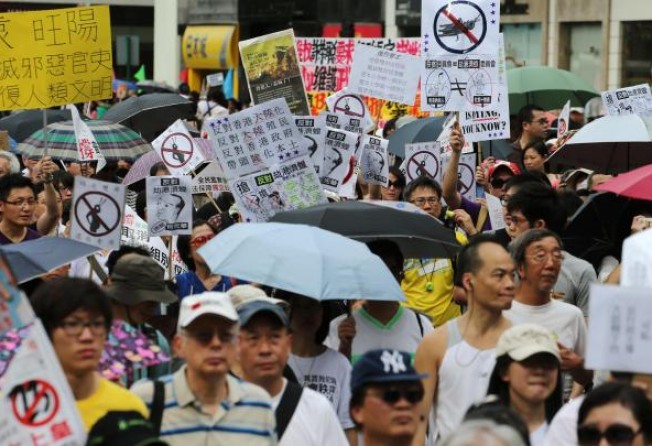Retiring Paul Hung 'comfortable' about police protest headcounts
Retiring senior policeman reveals that officers take overhead crowd photos to verify figures

After policing public protests for seven years, a senior police officer is retiring with a "comfortable" feeling about the force's sometimes controversial headcounts of protesters at rallies.
Police Director of Operations Paul Hung Hak-wai revealed for the first time that the force took overhead crowd photos to verify crowd counts at some public demonstrations. Hung, who will turn 57 on Tuesday, is about to take pre-retirement leave.
Over the years, he told the South China Morning Post, he has sometimes had moments of doubt about the accuracy of police headcounts.
Protest organisers have often accused the force of suppressing the true number of demonstrators. After the annual July 1 rally last year, the police said 63,000 took part while organisers put it at 400,000.
"[When] they put the figure so high, sometimes I wondered if there was something wrong with my count," Hung said.
To verify their headcount at one massive rally a few years ago, Hung asked officers to take continuous photos of the marchers as they passed below a high vantage point in Wan Chai.
"If you had connected all those photos together, the image would probably have stretched from the front of Caine House [at police headquarters] out the back door," Hung said. "I asked my colleagues to count the crowd, head by head, two times over."
He was relieved when their counts varied by only 1,200 from the final estimate of 72,000 marchers. "I feel comfortable about that result now," he said. The normal approach, he said, is to station officers at vantage points to count the passing crowd, section by section, and to release the highest figure they calculate as the peak turnout.
But photography did not always provide a satisfactory count. During one June 4 candlelight vigil a few years ago, Hung deployed about 30 officers to count people, using magnified photos, while the vigil was still going on. But pictures from the evening event were too dark for a satisfactory count, he said.
Police count crowds to ensure they have deployed enough officers at an event, and release their counts only when asked by the media, Hung said.
"People always say we have political motives for suppressing the accurate figure," Hung said. "But that is really irrelevant [as there is no truth to it]."
University of Hong Kong social work expert Professor Paul Yip Siu-fai, who makes his own counts of crowd numbers, said aerial pictures do not tell the whole story: they simply depict the situation at a certain time and place along a route - which Hung acknowledges.
Yip and the university's Public Opinion Programme try to calculate the number of people who join and leave a rally while it's in progress, using telephone surveys, and adjust their figures afterwards.
Yip said the police figures were quite reliable when adjusted in this way - while organisers always exaggerated their counts. Hung acknowledged the police counters do not make such adjustments.
Icarus Wong Ho-yin, vice-convenor of the Civil Human Rights Front, which organises the annual July 1 rally, said the group worked out its crowd estimates by counting people at different stages of a march.
Hung, who holds the rank of senior assistant commissioner, worked briefly at the post office after leaving secondary school, then joined the police force as a constable in 1975. He was the first junior ranking officer to attain such a high position - just two ranks away from commissioner.
He obtained a master's degree in business management in 2005 and a doctorate in 2011.
After 38 years on the force, he said he would relax with his wife on a trip to Bhutan next month. He will be succeeded by his deputy, Tony Wong Chi-hung.